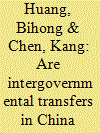|
|
|
Sort Order |
|
|
|
Items / Page
|
|
|
|
|
|
|
| Srl | Item |
| 1 |
ID:
128151


|
|
|
|
|
| Publication |
2012.
|
| Summary/Abstract |
Since 1994, China's central government has implemented a sequence of fiscal recentralization measures to increase its equalization capacity and reduce regional income disparities. However, the effect of intergovernmental transfers on equalization has been called into question by anecdotal evidence that seems to suggest that transfers from the center are not rule-based and are subject to heavy rent-seeking. Unlike past studies, which have focused on the equalization effects of total fiscal transfers from the center, this paper includes an examination of the equalization effects of different types of transfers because some transfers, which are inherently anti-equalizing, may mask the equalization effects of other types of transfers when they are lumped together to find the "average" effect. Using inequality measures, a decomposition of fiscal disparities, and dynamic panel data models, we find that China's intergovernmental transfer system that was established in 1994 does have some equalizing elements. To a large extent, these elements exist due to the mechanism designed to shrink the tax rebates that bear the legacy of the pre-1994 system; to a small extent, these elements exist due to the rule-based general-purpose transfer whose share in total transfers remains small but has increased since 2002. However, the equalization effects of the largest component of transfers, specific-purpose transfers, are anti-equalizing. They are typically not rule-based and thus subject to political influence. As a result, total transfers also exhibit significant anti-equalization effects.
|
|
|
|
|
|
|
|
|
|
|
|
|
|
|
|
| 2 |
ID:
156472


|
|
|
|
|
| Summary/Abstract |
This paper studies the economic and environmental impacts of foreign direct investment (FDI) in China. First, we build a simple theoretical model to predict the overall beneficial effects of FDI, and also find that a stronger sense of “environmental citizenship” by the FDI firm is associated with lower pollution and lower emission intensity in the host region. For empirical analysis, we use Spatial Durbin Model (SDM) to address the regional spillovers of FDI and pollution in China, and confirm the beneficial impacts of FDI both environmentally and economically. We also find that FDI from Hong Kong, Macau, and Taiwan (HMT) that is assumed to exhibit a stronger sense of environmental citizenship due to its closer ties with mainland China, significantly improves the host region's environmental outcome but has no measurable effects on its economic growth; in contrast, FDI from other origins significantly promotes the economic growth of the host economy although it has no measurable impacts on the environmental outcome.
|
|
|
|
|
|
|
|
|
|
|
|
|
|
|
|
| 3 |
ID:
147408


|
|
|
|
|
| Summary/Abstract |
Using data from the four waves of the China Health and Nutrition Survey (CHNS), this paper assesses the impacts of adult children migration on the health of their parents left behind. We employ the endogenous treatment effects model to address the selection bias and infer the causal effects of children migration on parental health. We find that children migration significantly impairs the health of their elderly kin. Moreover, children migration has remarkably differentiated locality, gender, age, and employment impacts, with rural, female, old-aged, and unemployed parents being more likely to suffer from poor health than their urban, male, middle-aged, and employed counterparts.
|
|
|
|
|
|
|
|
|
|
|
|
|
|
|
|
|
|
|
|
|